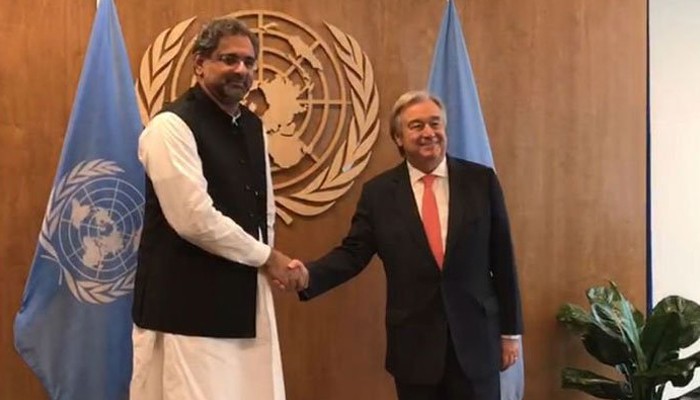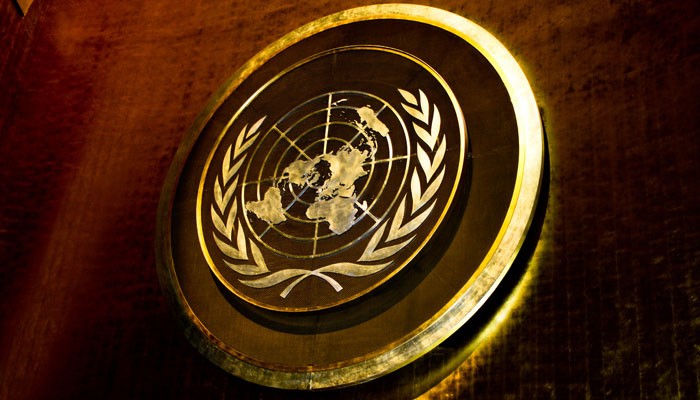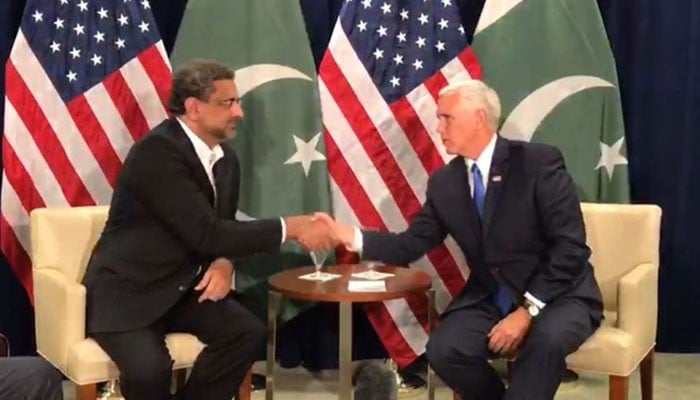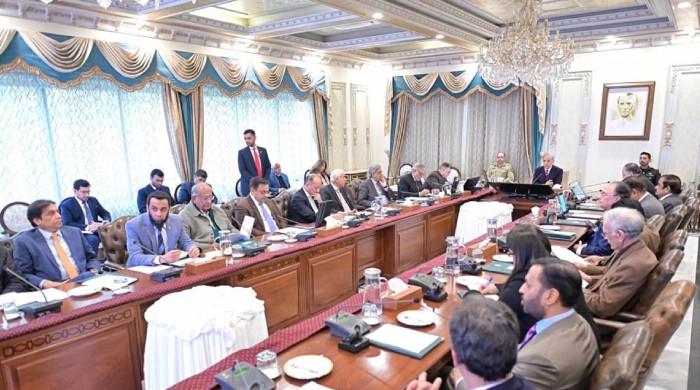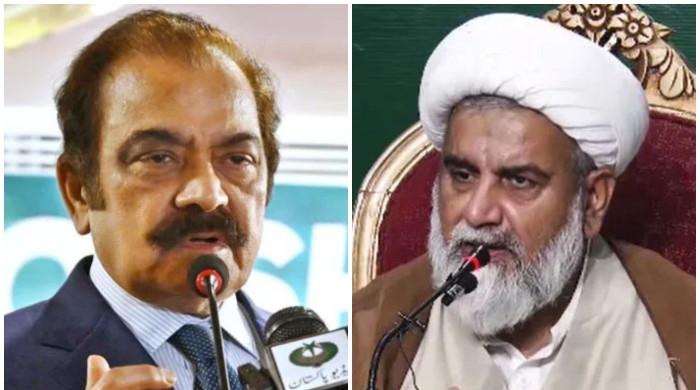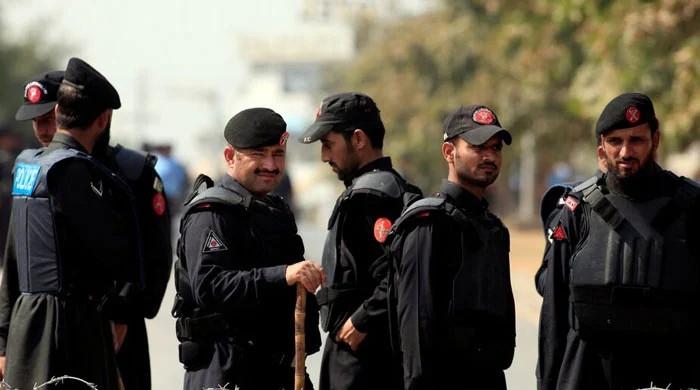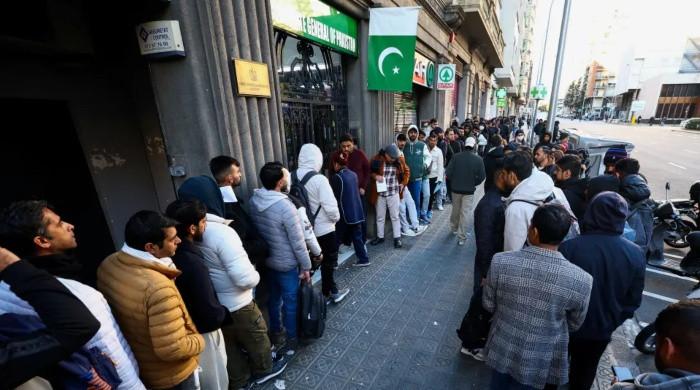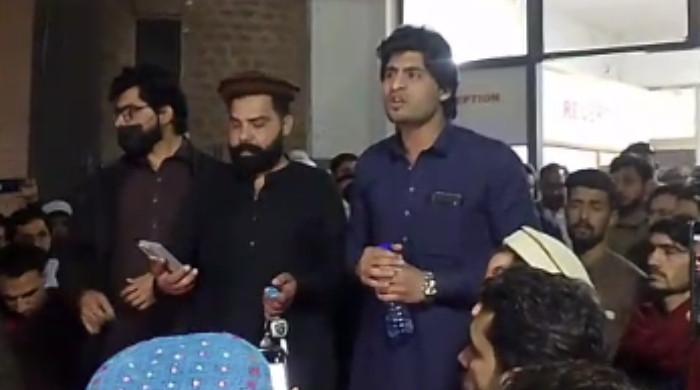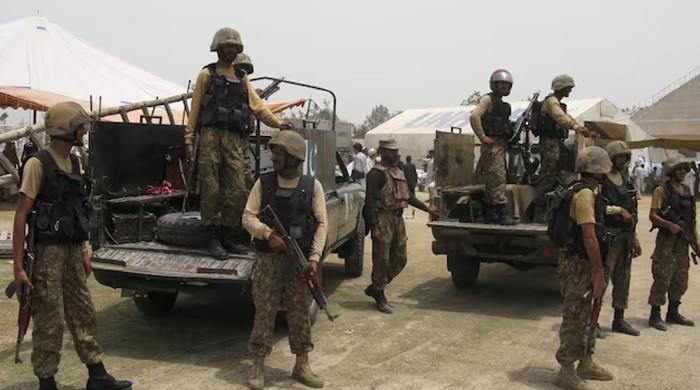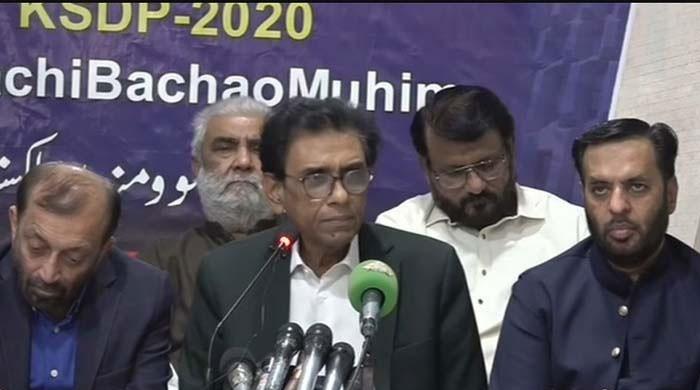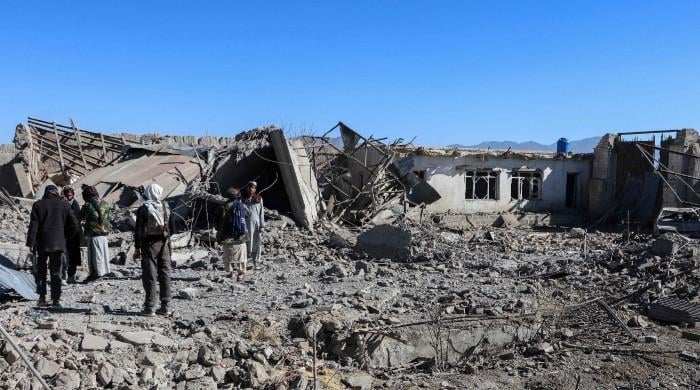India’s role in Kashmir worst example of foreign occupation, says PM at UN
PM Shahid Khaqan Abbasi also held a brief meeting with US President Trump on the sidelines of the UNGA's 72nd session
September 22, 2017
NEW YORK/KARACHI: Prime Minister Shahid Khaqan Abbasi during his address to the 72nd session of the United Nations General Assembly (UNGA) in New York on Thursday, highlighted the persistent human rights violations in Indian-occupied Kashmir (IoK), terming India's role in the region the "most intense example of foreign occupation".
In what marked his debut at the highest international diplomacy — after taking over the office last month following former prime minister Nawaz Sharif's ouster in July — Abbasi delivered a crisp and concise speech that touched upon almost every key factor positive for or detrimental to Pakistan's growth and development.
The premier made it clear that Pakistan "is not prepared to be anyone's scapegoat", noting that Pakistan has been consistently active in the war against terrorism and has lost more to the cause than any other nation.
During his 20-minute speech, he said that while Daesh has been decimated in most Middle Eastern regions, including Yemen, the group's creeping global influence is evident through the recent events around the world.
Abbasi mentioned to the attendees that the UN charter has over time been eroding slowly, with unresolved conflicts taking a much larger part of the headlines than before, the rampant Indian aggression in occupied Kashmir a stark example of that.
Analysts and journalists at home and abroad praised the prime minister's address, saying that he smartly informed the UN of strategical issues — both local and regional — that Pakistan is currently facing and clearly pointed out the role the country has played so far in each of them.
Demand to end Indian atrocities in occupied Kashmir
Highlighting the struggle of the Kashmiri people for their right to self-determination, PM Abbasi said India refuses to implement the unanimous resolutions of the UN Security Council, which mandate a UN-supervised plebiscite to enable the people of occupied Kashmir to freely decide their destiny.
"Instead, India has deployed nearly 700,000 troops in occupied Kashmir to suppress the legitimate struggle of the Kashmiris to exercise their right to self-determination. This is the most intense foreign military occupation in recent history," he said.
In response to Kashmiris' heroic and popular struggle to rid themselves of India’s oppressive rule, India has responded with massive and indiscriminate force to suppress the Kashmiris, shooting indiscriminately at children, women and youth, he pointed out.
Abbasi urged an "international investigation into India's crimes in Kashmir" and warned of escalation on their military frontier, the Line of Control (LoC).
"Pakistan has acted with restraint. But if India does venture across the LoC, or acts upon its doctrine of limited war against Pakistan, it will evoke a strong and matching response," he said.
He reiterated that Pakistan remains open to resuming a comprehensive dialogue with India to address all outstanding issues, especially Kashmir, and discuss measures to maintain peace and security.
Abbasi also underscored how the world is watching the ongoing mass genocide of Rohingya Muslims in Myanmar, while no effective measure has been taken in that regard.
Pakistan 'not prepared to be anyone’s scapegoat'
PM Abbasi noted that the state-sponsored terrorism is an issue of considerable importance since foreign elements and safe havens across the border continuously stay engaged in disrupting the peaceful, democratic environment of Pakistan.
The prime minister emphasised on how "no one desires peace in Afghanistan more than Pakistan"; however, he urged the world to understand that it "will not allow the Afghan war to be fought on its soil".
Pakistan is not prepared to be anyone's scapegoat in Afghan war, he stressed.
Abbasi did not explicitly criticise US President Donald Trump's new strategy on Afghanistan but made clear his displeasure with the renewed onus on Pakistan.
"Having suffered and sacrificed so much due to our role in the global counterterrorism campaign, it is especially galling for Pakistan to be blamed for the military or political stalemate in Afghanistan," Abbasi said.
Pakistan does not "endorse any failed strategy that will prolong and intensify the suffering of the people of Afghanistan and Pakistan and other regional countries", he said.
The PM said that 27,000 Pakistanis have been killed by extremists since the launch of the US war on terror after the September 11, 2001, attacks.
He called for a priority on eliminating extremists — including from Daesh and Al-Qaeda — in Afghanistan but ultimately a political solution with the Taliban.
US forces tracked down and killed Osama bin Laden back in 2011 in Abbottabad.
Then last month, while unveiling his new strategy, Trump pledged to take a tougher line on Pakistan — making public what had long been more private US frustrations.
The American president sent thousands more US troops to Afghanistan in a bid to defeat the Taliban, reversing his previous calls to end America's longest-ever war.
'Resorting to force won't bring peace'
Yet Pakistan has been the host to approximately three million Afghan refugees. It is, therefore, imperative for the country to push for peace in Afghanistan, which, Abbasi said, is not achievable through an armed and aggressive operation.
It has been clear now — evidenced by 16 years of conflict — that "peace cannot be restored by resorting to force", Abbasi said. There have been cross-border attacks, the prime minister admitted but not initiated by Pakistan. Those were "from foreign elements".
According to Abbasi, Pakistan believes there are two urgent and realistic goals; "first, the effort to eliminate Daesh, Al Qaeda and its affiliates, the Tehrik-i-Taliban Pakistan (TTP), and Jamaat-ul-Ahrar".
And the second is to promote negotiations between Kabul and militants, a peaceful settlement, he said.
Pakistan's efforts 'cannot be questioned'
It is, therefore, crucial to note that Pakistan's counterterrorism efforts cannot be questioned, PM said.
Pakistan Army — through its operations in various tribal areas in the western and northern parts of the country — has succeeded in clearing extremist groups and their operations.
More than 27,000 Pakistanis, including 6,500 of the military, have been martyred by terrorists. Another 50,000 have been injured — many of whom lost their limbs, he highlighted.
Pakistan has also borne significant economic and financial dents. Almost $120 billion has been spent to fight and eliminate terrorist and militant outfits, he pointed out.
Abbasi's comments regarding the financial burden Pakistan has had to go under was a direct response to Trump's statement of conveniently narrowing down the US as the only bearer of economic costs of terrorism.
"We have been paying Pakistan billions and billions of dollars at the same time they are housing the very terrorists that we are fighting," Trump had said.
Following a brief initial silence, Foreign Minister Khawaja Asif had finally responded. "Our contributions and sacrifices as an ally have not been acknowledged as they deserved to have been acknowledged," he said, adding that the country's commitment towards the war on terror was "unmatched".
However, the strongest reply perhaps came from Chief of Army Staff General Qamar Javed Bajwa, who said that Pakistan has done enough in the war on terror and now it is time for the world to do more.
"If Pakistan has not done enough in the war against terror, then no country in the world has done enough," the army chief had said.
Bajwa had added that the Pakistan's armed forces have paid with their blood during numerous military operations. "Only Pakistan has seen this level of success with such limited resources. From Operation Sher Dil to Rah-e-Rast, Rah-e-Nijat, Zarb-e-Azab, and, now, Raddul Fasaad, we have paid for each inch with our blood."
Global phenomenon
Terrorism has now turned into a "global phenomenon", Abbasi noted, giving the examples of extremist activities around the world that have left hundreds dead and thousands more wounded.
"We remain fully committed to the National Action Plan (NAP) against extremism and terrorism; terrorism is now a global phenomenon," he said.
Afghan President Ashraf Ghani in his own speech to the United Nations, on the other hand, appealed to Pakistan for dialogue, saying that the neighbours can work together to eliminate extremism.
PM Abbasi's debut at UN
The PM's speech was scheduled to commence at 6 PM EDT (3 AM PST, Friday), but it was readjusted by approximately 45 minutes since some speakers prior to him took longer than the average 15-minute duration.
Abbasi was 12th in the list of speakers to address the UNGA.
The Premier arrived in New York on Monday to lead the country's delegation to the 72nd session of the UN General Assembly. He has since talked of Pakistan's position on key international issues, including the Kashmir dispute.
Before addressing the assembly, PM Abbasi met with United Nations Secretary-General Antonio Guterres.
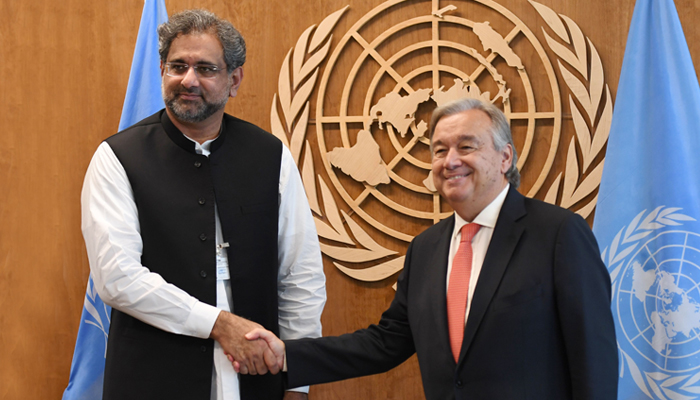
PM Abbasi has also held key meetings with a number of world leaders during his stay in New York. These included calls on the United States Vice President Mike Pence and Turkish President Recep Tayyip Erdogan, among others.
'Positive' meeting with President Trump
PM Abbasi also had a brief meeting with US President Donald Trump at a reception he hosted for the world leaders attending the UNGA’s 72nd session. He disclosed this at a luncheon meeting of the US-Pakistan Business Council on Wednesday.
The interaction with Trump took place after his 45-minute long meeting with US Vice President Mike Pence, during which the two talked bilateral issues and the Afghan situation.
"President Trump was very positive about Pakistan," Abbasi told the American businessmen and investors. He said he told Trump that Pakistan was committed to fighting terrorism in all its forms and manifestations.
Abbasi later told the Council on Foreign Relations that "Pakistan wants to move forward and remain engaged with the United States".
The White House, in a statement issued earlier, said, "The Vice President and Prime Minister Abbasi had an important conversation about the President's South Asia strategy that was announced late last month."
As per the statement, the vice president reiterated Trump's belief that "Pakistan has much to gain from partnering with our effort" in the region.
—Additional reporting by Mona Khan and Azim M. Mian in New York
COVER IMAGE: Pakistan's Prime Minister Shahid Khaqan Abbasi addresses the UN General Assembly at the United Nations, New York, US, September 21, 2017. AFP/Kevin Hagen/Getty Images
